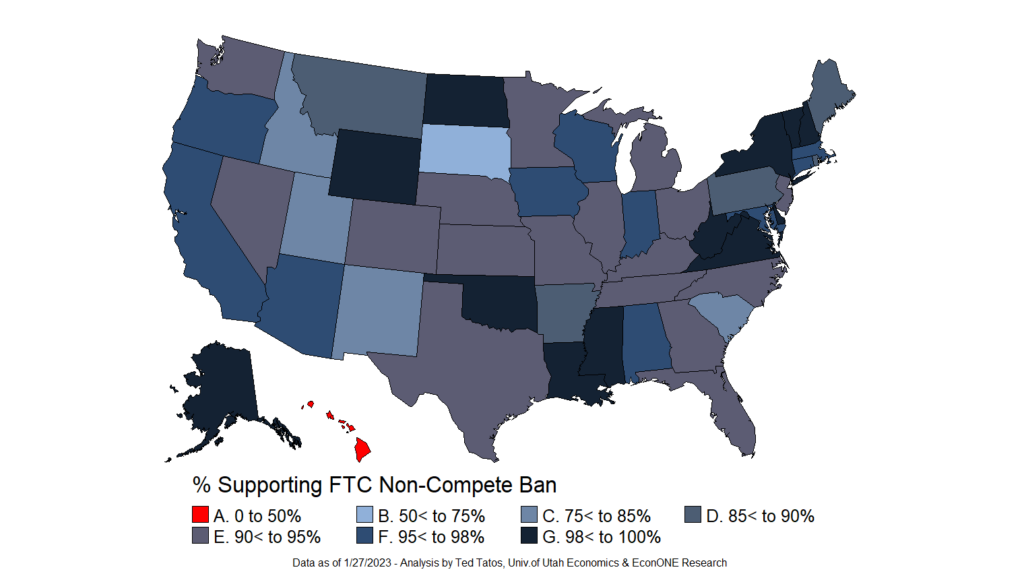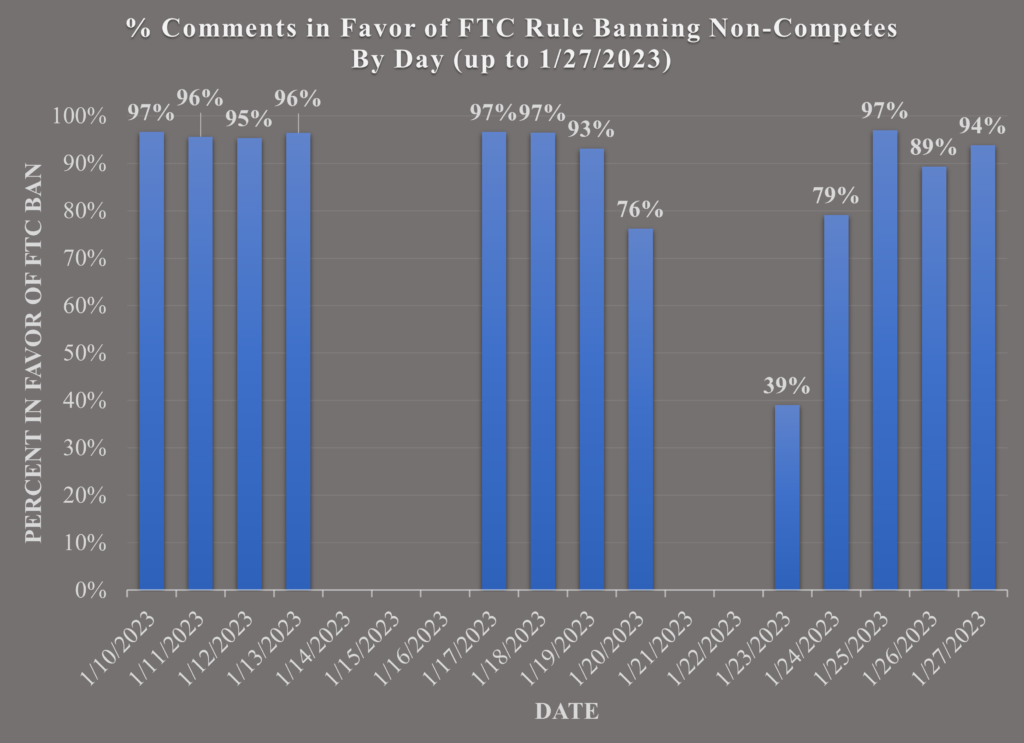An analysis of public comments submitted to the FTC
In conjunction with its proposed ban on noncompete agreements, the FTC solicited comments on from any interested parties. Submission began on January 10 and, as of Friday, January 27, 2022, approximately 5,200 comments had been submitted. Fortunately, under the eRulemaking Initiative, the US Government has broadened public access to documents, permitting bulk download of comments pertaining to regulatory materials, including the FTC proposed ban on noncompete agreements.
Bulk download permits the output of all comments to a delimited text file, allowing the various fields including dates, individual and/or corporate entity submitting the comment (where available), state (again, where available) to be analyzed. Further, the comments field, which includes submissions up to 5,000 characters in length, permits text parsing for keywords such as type of employment, hourly wages, and other phrases of interest. Most importantly, the comments field reveals the submitting entity’s stance toward the proposed rulemaking.
This article describes my ongoing analysis of these data through January 27. Updated results will be uploaded periodically through the March 20, 2023 deadline for comment submissions.
As of January 27, the results:
- demonstrate overwhelming public support for the ban on non-compete agreements. Such support is consistent across individual states, underscoring bipartisan agreement on prohibiting such restraints of trade.
- highlight the ubiquity of such agreements and their ability to constrain both lower wage and higher wage labor
- reveal that medical professionals, including physicians, represent the single most vocal group supporting the FTC’s proposed rule and advocating for a complete ban on non-compete agreements. This result exposes the flaw in attempting to cabin the scope of the rulemaking to lower-wage workers. While arguments supporting non-compete clauses may appear least defensible when encumbering lower-wage workers, the comments indicate that the negative effects are no less pronounced on those earning higher wages, such as doctors and others in the healthcare field. Further, as myriad comments observe, such constraints can have negative spillover effects, such as entrenching monopsony power, raising healthcare costs, and lowering the quality of care.
- expose the incongruity of economic theory proffered by some in defense of non-compete agreements when juxtaposed against the real-world experiences of workers who labor under such restrictions.
The overall results including comments submitted through January 27, 2023 appear in Table 1 below. Overall, approximately 93% of comments reflect support for the FTC’s proposed ban. Determination of whether the respondent supported or opposed the FTC rulemaking proceeded as follows. Of the approximately 5,200 comments received as of January 27, I reviewed approximately 3,626 by reading or skimming each comment individually. The reminder were classified as 1) supporting the ban if they contained keywords such as “depress”, “oppress”, “trap”, “archaic”, “in favor”, “eliminate”, “monopoly” or 2) opposing the ban if they contain key phrases such as “to the state”, “overreach”, “object”, “oppose”, “protect small”, “damage small”, “hurt small”, “harm small”. The latter comments were interpreted to mean that the FTC’s rulemaking would hurt small businesses or infringe upon states’ rights. Individual review of the 3600+ comments informed the determination of the keywords and phrases used.
Table 1. Results

The overwhelming support for the FTC’s rulemaking banning non-compete agreements shown in Table 1 extends nationwide, with every state except Hawaii (n=2) indicating that the majority of commenters favor of the FTC’s proposed ban. Among states with at least 10 respondents, the lowest rates of approval were 78.9%, 80% and 81.8% for New Mexico, Utah, and South Carolina, respectively.

The figure below provides a daily breakdown of the percentage of comments submitted that supported the proposed ban on non-compete agreements. The results provide some evidence of coordination of responses in opposition to the FTC’s position. A substantially higher proportion of comments opposing the proposed rulemaking occurred during the 3-day period of January 20, 23 and 24 (the 21st and 22nd were weekend days so the data did not include comments on those dates), reaching a zenith on January 23.

I also analyzed the extent of support for the ban on non-competes by occupation, as reflected in the comments. By far the most common occupation listed referenced work as either a “physician”, a specialty therein (e.g., cardiologist, radiologist, etc.) or a generic description of the medical field. Other noted occupations included accounting (e.g., CPA), dentist, veterinarian, engineering, spa/salon, insurance, or restaurant-related work.
The support among physicians for the ban on non-competes was nearly unanimous. Approximately 98% decried the use of non-competes, citing their harm to physician careers, their families, as well as the negative impact non-competes have on quality of care.

Support for non-competes largely originates from owners of individual practices who expressed concern that their employees may leave and “open up shop across the street” and compete with them. However, even business owners overwhelmingly support the FTC’s proposed rule. Among comments that included terms such as “small business” or “small company(ies)” approximately 68.9% of comments favored the FTC ban, a nearly identical result when evaluating comments indicating ownership of a company (69.3% in favor of the FTC ban).
Many supporters of the FTC’s planned rulemaking vehemently rejected the restraints imposed by non-compete agreements, likening them to indentured servitude, slavery, and using evocative terms such as “toxic”, “chains”, “prison”, “trap”, “bully” and “exploit”. Of the 4653 respondents who supported the FTC’s ban (93.2% of total), approximately 730 (15.7%) used at least one of these terms in their comments.
Note: Ted Tatos is an adjunct professor of economics at the University of Utah and a testifying expert with EconONE Research. This analysis of responses to FTC comments will be updated periodically until the March 20 deadline.